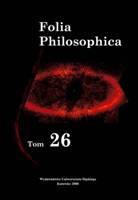Problem wyobraźni w filozofii Kanta i Hegla
The issue of imagination in Kant’s and Hegel’s philosophy
Author(s): Radosław KuliniakSubject(s): Philosophy
Published by: Wydawnictwo Uniwersytetu Śląskiego
Keywords: imagination; cognition; synthesis; a priori; intellect
Summary/Abstract: The article was devoted to Kant’s and Hegel’s attempt to define the cognitive function and role ascribed to imagination. Kant observed, among other things, that it cannot play a slavish function either with respect to senses or intellect. Kant does not perceive imagination as the power of recognition, thanks to which a synthesis of presentations takes place supporting intellect in the process of constituting notions and allowing for a stable relationship with possible experience. It means that notions cannot be used beyond the subjects of our imaginations about them. They are depicted either as a priori or give us an insight into sensual data. Thus, cognition does not have non-subject-like elements. First problems appear when Kant makes an attempt to define the conditions of synthesis, and, subsequently, the issues of “what” and “how” we learn. In this respect, Hegel considers imagination as an absolute power however the one which in its action is not fully given to us. Its existence is nothing coincidental because it gives the possibility of accessing the world of presentations. Though it is not the only power uniting the world of presentations. The presentations are rather the condition of the examination of the subject being learned. In such a way we are exposed to viewing presentations and their cognition.
Journal: Folia Philosophica
- Issue Year: 2008
- Issue No: 26
- Page Range: 221-236
- Page Count: 16
- Language: Polish

